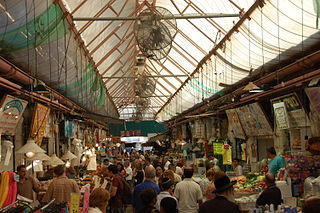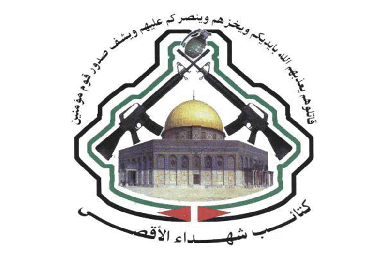Note: This compilation includes only those attacks that resulted in casualties. Attacks which did not kill or wound are not included.
Note: The death toll quoted here is just the sum of the listings. There may be many omissions from the list. The human rights organisation B'Tselem has complied statistics of about 600 deaths during 2003 in the occupied territories alone.
This page is a partial listing of incidents of violence in the Israeli-Palestinian conflict in 2004.

The Maxim restaurant suicide bombing was a suicide bombing which occurred on October 4, 2003 in the beachfront "Maxim" restaurant in Haifa, Israel. Twenty-one people were killed in the attack and 60 were injured. Among the victims were two families and four children, including a two-month-old baby.

A Palestinian suicide bombing on Sbarro, a pizzeria in downtown Jerusalem, took place on 9 August 2001, in which 16 civilians were killed, including 7 children and a pregnant woman, and 130 wounded.
This page is a partial listing of incidents of violence in the Israeli-Palestinian conflict in 2005.

Palestinian political violence refers to acts of violence perpetrated for political ends in relation to the State of Palestine or in connection with Palestinian nationalism. Common political objectives include self-determination in and sovereignty over Palestine, or the "liberation of Palestine" and recognition of a Palestinian state, either in place of both Israel and the Palestinian territories, or solely in the Palestinian territories. More limited goals include the release of Palestinian prisoners or the Palestinian right of return. Other motivations include personal grievances, trauma or revenge.
The 2006 Tel Aviv shawarma restaurant bombing was a suicide bombing on April 17, 2006 at "Rosh Ha'ir" shawarma restaurant in Tel Aviv, Israel. Eleven Israeli civilians were killed in the attack and 70 were injured. The Palestinian militant organization Islamic Jihad claimed responsibility for the terror attack.
Numerous attacks were carried out by Palestinians near the illegal Israeli settlement of French Hill in northern East Jerusalem.
Events in the year 2004 in Israel.
Events in the year 2002 in Israel.

The Camp 80 junction bus 823 attack was a suicide bombing on November 29, 2001, on an Egged bus in northern Israel. The bus, en route from Nazareth to Tel Aviv, was traveling through the town of Pardes Hanna-Karkur. Three passengers were killed in the attack and nine were injured.

The Afula mall bombing was a terrorist attack which occurred on May 19, 2003 in which a Palestinian suicide bomber blew herself up outside the "Shaarei HaAmakim" mall in Afula, Israel, killing 3 Israeli civilians and injuring 70.
Events in the year 2004 in the Palestinian territories.
Events in the year 2003 in the Palestinian territories.
A Palestinian suicide bombing occurred in the Beit Yisrael neighborhood in downtown Jerusalem on March 2, 2002. Eleven Israeli civilians were killed in the attack, including two infants, three children and two teenagers. Over 50 people were injured in the attack, four of them critically. The bombing took place at the entrance of the Haredi yeshiva "Beit Yisrael" in central Jerusalem where people had gathered for a bar mitzvah celebration. The suicide bomber detonated the bomb full of shrapnel alongside a group of women with their baby strollers, waiting for the services in a nearby synagogue to conclude. The Palestinian militant organization al-Aqsa Martyrs' Brigades claimed responsibility for the attack.

A suicide bombing occurred on 12 April 2002 at a bus stop located at the entrance to the Mahane Yehuda Market, Jerusalem's main fruit and vegetable market. The site of the attack was chosen in order to cause maximum number of casualties. 6 civilians were killed in the attack and 104 were injured. The al-Aqsa Martyrs' Brigades claimed responsibility for the attack.
A suicide bombing occurred on 19 June 2002, in a crowded bus stop and hitchhiking post at the French Hill settlement in northern East Jerusalem. The site of the attack was chosen in order to cause a maximum number of casualties. Seven people were killed in the attack, and 35 were injured.

A suicide bombing was carried out on 29 March 2002 by 18-year-old Ayat al-Akhras, who blew herself up at the entrance of the main supermarket in the Jerusalem neighborhood of Kiryat HaYovel, killing three people and injuring 28. Hamas claimed responsibility for the attack.

The al-Aqsa Martyrs' Brigades is a coalition of Palestinian armed groups in the West Bank. The organization has been designated as a terrorist organization by Israel, the European Union, Canada, Japan, New Zealand, and the United States.









